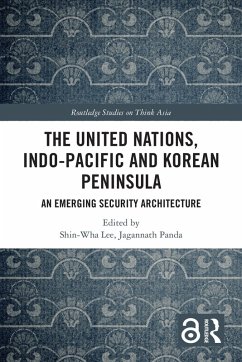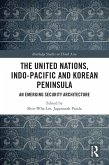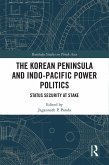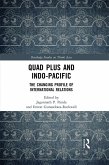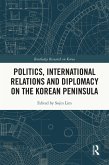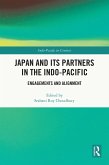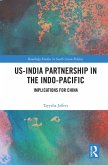The United Nations, Indo-Pacific and Korean Peninsula (eBook, PDF)
An Emerging Security Architecture
Redaktion: Lee, Shin-Wha; Panda, Jagannath
42,95 €
42,95 €
inkl. MwSt.
Sofort per Download lieferbar

21 °P sammeln
42,95 €
Als Download kaufen

42,95 €
inkl. MwSt.
Sofort per Download lieferbar

21 °P sammeln
Jetzt verschenken
Alle Infos zum eBook verschenken
42,95 €
inkl. MwSt.
Sofort per Download lieferbar
Alle Infos zum eBook verschenken

21 °P sammeln
The United Nations, Indo-Pacific and Korean Peninsula (eBook, PDF)
An Emerging Security Architecture
Redaktion: Lee, Shin-Wha; Panda, Jagannath
- Format: PDF
- Merkliste
- Auf die Merkliste
- Bewerten Bewerten
- Teilen
- Produkt teilen
- Produkterinnerung
- Produkterinnerung

Bitte loggen Sie sich zunächst in Ihr Kundenkonto ein oder registrieren Sie sich bei
bücher.de, um das eBook-Abo tolino select nutzen zu können.
Hier können Sie sich einloggen
Hier können Sie sich einloggen
Sie sind bereits eingeloggt. Klicken Sie auf 2. tolino select Abo, um fortzufahren.

Bitte loggen Sie sich zunächst in Ihr Kundenkonto ein oder registrieren Sie sich bei bücher.de, um das eBook-Abo tolino select nutzen zu können.
This book focuses on the UN and the power politics of the Korean Peninsula and the Indo-Pacific. It will be of interest to researchers studying International Relations, Security Studies, Asian Studies, in particular Korean Studies and the Indo-Pacific.
- Geräte: PC
- mit Kopierschutz
- eBook Hilfe
Andere Kunden interessierten sich auch für
![The United Nations, Indo-Pacific and Korean Peninsula (eBook, ePUB) The United Nations, Indo-Pacific and Korean Peninsula (eBook, ePUB)]() The United Nations, Indo-Pacific and Korean Peninsula (eBook, ePUB)42,95 €
The United Nations, Indo-Pacific and Korean Peninsula (eBook, ePUB)42,95 €![The Korean Peninsula and Indo-Pacific Power Politics (eBook, PDF) The Korean Peninsula and Indo-Pacific Power Politics (eBook, PDF)]() The Korean Peninsula and Indo-Pacific Power Politics (eBook, PDF)43,95 €
The Korean Peninsula and Indo-Pacific Power Politics (eBook, PDF)43,95 €![Quad Plus and Indo-Pacific (eBook, PDF) Quad Plus and Indo-Pacific (eBook, PDF)]() Quad Plus and Indo-Pacific (eBook, PDF)44,95 €
Quad Plus and Indo-Pacific (eBook, PDF)44,95 €![Politics, International Relations and Diplomacy on the Korean Peninsula (eBook, PDF) Politics, International Relations and Diplomacy on the Korean Peninsula (eBook, PDF)]() Politics, International Relations and Diplomacy on the Korean Peninsula (eBook, PDF)42,95 €
Politics, International Relations and Diplomacy on the Korean Peninsula (eBook, PDF)42,95 €![Japan and its Partners in the Indo-Pacific (eBook, PDF) Japan and its Partners in the Indo-Pacific (eBook, PDF)]() Japan and its Partners in the Indo-Pacific (eBook, PDF)41,95 €
Japan and its Partners in the Indo-Pacific (eBook, PDF)41,95 €![US-India Partnership in the Indo-Pacific (eBook, PDF) US-India Partnership in the Indo-Pacific (eBook, PDF)]() Tayyaba JafferyUS-India Partnership in the Indo-Pacific (eBook, PDF)42,95 €
Tayyaba JafferyUS-India Partnership in the Indo-Pacific (eBook, PDF)42,95 €![India-Korea Connections in the Indo-Pacific (eBook, PDF) India-Korea Connections in the Indo-Pacific (eBook, PDF)]() India-Korea Connections in the Indo-Pacific (eBook, PDF)41,95 €
India-Korea Connections in the Indo-Pacific (eBook, PDF)41,95 €-
-
-
This book focuses on the UN and the power politics of the Korean Peninsula and the Indo-Pacific. It will be of interest to researchers studying International Relations, Security Studies, Asian Studies, in particular Korean Studies and the Indo-Pacific.
Dieser Download kann aus rechtlichen Gründen nur mit Rechnungsadresse in A, B, BG, CY, CZ, D, DK, EW, E, FIN, F, GR, HR, H, IRL, I, LT, L, LR, M, NL, PL, P, R, S, SLO, SK ausgeliefert werden.
Produktdetails
- Produktdetails
- Verlag: Taylor & Francis eBooks
- Seitenzahl: 292
- Erscheinungstermin: 18. August 2023
- Englisch
- ISBN-13: 9781000928631
- Artikelnr.: 68342676
- Verlag: Taylor & Francis eBooks
- Seitenzahl: 292
- Erscheinungstermin: 18. August 2023
- Englisch
- ISBN-13: 9781000928631
- Artikelnr.: 68342676
- Herstellerkennzeichnung Die Herstellerinformationen sind derzeit nicht verfügbar.
Shin-wha Lee is Professor at the Department of Political Science and International Relations and Director of Peace and Democracy Institute, Korea University and President of the Korean Academic Council on the UN System. She has published numerous articles and books, covering issues of global security including non-traditional security, international organisations, East Asian foreign policy and security cooperation. Jagannath P. Panda is Head of the Stockholm Center for South Asian and Indo-Pacific Affairs (SCSA-IPA), Institute for Security and Development Policy (ISDP), Stockholm, Sweden. and Senior Fellow at The Hague Centre for Strategic Studies, The Netherlands. He is also Director for Europe-Asia Research Cooperation at the Yokosuka Council of Asia-Pacific Studies, Japan. Dr. Panda is the author of the book India-China Relations (2017) and editor of Quad Plus and Indo-Pacific (2021), The Korean Peninsula and Indo-Pacific Power Politics: Status Security at Stake (2020), The Future of Korean Peninsula: Korea 2032 and Beyond (2021) and India-Japan-ASEAN Triangularity (2022), all published by Routledge. He is also Editor of the series Routledge Studies on Think Asia.
Introduction: Can the Declining Relevance of the UN be Reinvigorated?
Factoring the Indo-Pacific and Korean Peninsula Part-I: The UN and
Competing Worldviews 1. US-China Strategic Competition in UN Multilateral
Frameworks: Building Order or Inviting Conflict?; 2. The United Nations in
Korea: US Views of Once and Future Roles; 3. Legitimacy, Power and
Order-Building in the Indo-Pacific: China, the UN, and Managing the North
Korean Nuclear Challenge; 4. Role of the United Nations in Japanese Foreign
Policy and Security Architecture; 5. The United Nations, Korean Foreign
Policy and the Korean Peninsula Part-II: The UN and the Indo-Pacific
Security Architecture 6. China, UNCLOS and the Future of International
Maritime Law in the South China Sea; 7. Opportunities for Consensus,
Collaboration and Recalibration: UN and the Quad; 8. Does Humanitarian Aid
Save Civilian Lives in War? The Case of UN Aid in Myanmar's Civil War; 9.
The United Nations and the Curious Case of Sino-Indian Boundary Dispute
Part-III: The UN, its Frameworks and Korean Peninsula 10. Northeast Asian
Peace Architecture and the UN; 11. Change in the Security Environment and
Transformation of the United Nations Command; 12. The Past, Present and
Future of SDGs Discussion on the Korean Peninsula: SDGs as a Framework for
New Cooperation; 13. A Case Study on the Success and Failure of Weapons of
Mass Destruction Nonproliferation Regimes: Focus on Chemical Weapons and
Biological Weapons Conventions; 14. Improving State Reputation through the
UN: The Case of North Korea
Factoring the Indo-Pacific and Korean Peninsula Part-I: The UN and
Competing Worldviews 1. US-China Strategic Competition in UN Multilateral
Frameworks: Building Order or Inviting Conflict?; 2. The United Nations in
Korea: US Views of Once and Future Roles; 3. Legitimacy, Power and
Order-Building in the Indo-Pacific: China, the UN, and Managing the North
Korean Nuclear Challenge; 4. Role of the United Nations in Japanese Foreign
Policy and Security Architecture; 5. The United Nations, Korean Foreign
Policy and the Korean Peninsula Part-II: The UN and the Indo-Pacific
Security Architecture 6. China, UNCLOS and the Future of International
Maritime Law in the South China Sea; 7. Opportunities for Consensus,
Collaboration and Recalibration: UN and the Quad; 8. Does Humanitarian Aid
Save Civilian Lives in War? The Case of UN Aid in Myanmar's Civil War; 9.
The United Nations and the Curious Case of Sino-Indian Boundary Dispute
Part-III: The UN, its Frameworks and Korean Peninsula 10. Northeast Asian
Peace Architecture and the UN; 11. Change in the Security Environment and
Transformation of the United Nations Command; 12. The Past, Present and
Future of SDGs Discussion on the Korean Peninsula: SDGs as a Framework for
New Cooperation; 13. A Case Study on the Success and Failure of Weapons of
Mass Destruction Nonproliferation Regimes: Focus on Chemical Weapons and
Biological Weapons Conventions; 14. Improving State Reputation through the
UN: The Case of North Korea
Introduction: Can the Declining Relevance of the UN be Reinvigorated?
Factoring the Indo-Pacific and Korean Peninsula Part-I: The UN and
Competing Worldviews 1. US-China Strategic Competition in UN Multilateral
Frameworks: Building Order or Inviting Conflict?; 2. The United Nations in
Korea: US Views of Once and Future Roles; 3. Legitimacy, Power and
Order-Building in the Indo-Pacific: China, the UN, and Managing the North
Korean Nuclear Challenge; 4. Role of the United Nations in Japanese Foreign
Policy and Security Architecture; 5. The United Nations, Korean Foreign
Policy and the Korean Peninsula Part-II: The UN and the Indo-Pacific
Security Architecture 6. China, UNCLOS and the Future of International
Maritime Law in the South China Sea; 7. Opportunities for Consensus,
Collaboration and Recalibration: UN and the Quad; 8. Does Humanitarian Aid
Save Civilian Lives in War? The Case of UN Aid in Myanmar's Civil War; 9.
The United Nations and the Curious Case of Sino-Indian Boundary Dispute
Part-III: The UN, its Frameworks and Korean Peninsula 10. Northeast Asian
Peace Architecture and the UN; 11. Change in the Security Environment and
Transformation of the United Nations Command; 12. The Past, Present and
Future of SDGs Discussion on the Korean Peninsula: SDGs as a Framework for
New Cooperation; 13. A Case Study on the Success and Failure of Weapons of
Mass Destruction Nonproliferation Regimes: Focus on Chemical Weapons and
Biological Weapons Conventions; 14. Improving State Reputation through the
UN: The Case of North Korea
Factoring the Indo-Pacific and Korean Peninsula Part-I: The UN and
Competing Worldviews 1. US-China Strategic Competition in UN Multilateral
Frameworks: Building Order or Inviting Conflict?; 2. The United Nations in
Korea: US Views of Once and Future Roles; 3. Legitimacy, Power and
Order-Building in the Indo-Pacific: China, the UN, and Managing the North
Korean Nuclear Challenge; 4. Role of the United Nations in Japanese Foreign
Policy and Security Architecture; 5. The United Nations, Korean Foreign
Policy and the Korean Peninsula Part-II: The UN and the Indo-Pacific
Security Architecture 6. China, UNCLOS and the Future of International
Maritime Law in the South China Sea; 7. Opportunities for Consensus,
Collaboration and Recalibration: UN and the Quad; 8. Does Humanitarian Aid
Save Civilian Lives in War? The Case of UN Aid in Myanmar's Civil War; 9.
The United Nations and the Curious Case of Sino-Indian Boundary Dispute
Part-III: The UN, its Frameworks and Korean Peninsula 10. Northeast Asian
Peace Architecture and the UN; 11. Change in the Security Environment and
Transformation of the United Nations Command; 12. The Past, Present and
Future of SDGs Discussion on the Korean Peninsula: SDGs as a Framework for
New Cooperation; 13. A Case Study on the Success and Failure of Weapons of
Mass Destruction Nonproliferation Regimes: Focus on Chemical Weapons and
Biological Weapons Conventions; 14. Improving State Reputation through the
UN: The Case of North Korea
